Born: 1958, Toronto
Debut: 1989
Genre: Pop / Rock
Achievements
– 2 major Juno Awards: Song of the Year (“Black Velvet”) and Album of the Year (Self-Titled), 1990
– Grammy Award (U.S.) for Best Female Rock Performance (“Black Velvet”), 1990
– First female Canadian artist to score a Diamond album in Canada
– 9 Top 40 Singles, including 4 Top 10s, 1 of which was #1
Biggest Hit Single Domestically
“Song Instead of a Kiss“
– Peaked at #1 on the RPM Weekly Singles Chart
– Finished in the Year-End Top 100 two years in a row
Biggest Hit Single Internationally
“Black Velvet“
– Peak Positions on the Weekly Charts: #10 Canada; #1 U.S., #2 U.K., #3 Australia, #3 Netherlands
– 81st biggest song of the year in Canada
– 18th biggest song of the year in the U.S.
Studio Albums and Hit Singles
1989: Alannah Myles
– Certified Diamond
– 6 million copies sold worldwide
– Hit Singles: “Love Is” (#16 CAN; #12 Australia; #36 U.S.), “Black Velvet” (See Above), “Still Got This Thing” (#28), “Lover of Mine” (#2 WP; #16 YE)
1992: Rockinghorse
– 2x Platinum
– Hit Singles: “Song Instead of a Kiss” (#1), “Our World, Our Times” (#27), “Living on a Memory” (#31), “Sonny Say You Will” (#23)
1995: A-lan-nah
– Hit Singles: “Family Secret” (#10 WP; #76 YE)
1997: Arrival
2008: Black Velvet
With names like Ginette Reno, Diane Dufresne, Diane Tell, Martine Saint-Clair, Mitsou, Patsy Gallant, Marjo, Véronique Béliveau, and Celine Dion, Canada’s Francophone community was way ahead of the game in terms of women in rock. Anglophone women had dabbled in the genre but becoming a superstar had meant, for the gender, performing country, folk, or adult contemporary tunes.
The 1980s saw male rock superstars Bryan Adams, Corey Hart, Gowan, and Tom Cochrane. Arguably, the first female to enjoy significant success was Luba. It appeared the door was now open. British import Sass Jordan with a couple of considerable hits was set up to enjoy further success in the next decade.
As we were heading into the 90s, though, no-one could have anticipated what was about to happen.
Alannah Myles was born to a father in radio, producer of “The Happy Gang”. Her mother was a pianist and singer. When she was a child, she knew she wanted to be a singer despite discouragement from her parents to pursue it as a profession. At age 11, she took up the guitar. By the age of 15, she was writing her own songs emulating her favourite folk artists Leonard Cohen, Linda Ronstadt, and Joni Mitchell. She got herself an agent in 1977 and played her songs around Toronto. To earn extra money, she did some television work, doing ads. She also worked as a backup singer and model. In the mid-80s, she hooked up with songwriter Christopher Ward and began performing some of his songs. The music industry rejected her outright; no record company was interested. Eventually, Bob Roper at WEA (Warner-Elektra-Atlantic) approached her after listening to her demo and signed her. David Tyson was chosen to produce her first (self-titled) album. She entered the recording studio with Christopher Ward who was to be a video jockey for MuchMusic.
The album was released and MuchMusic immediately played the music video for the first single “Love Is”. To the Canadian public, this sultry female rocker seemed to come out of nowhere. The entire nation was captivated. The single was aired on radio stations and peaked at #16 across the country. The second single, a tribute to American singer Elvis Presley called “Black Velvet” did even better, scraping the Top 10. It also became an international hit, topping the Billboard charts in the United States and the Top 3 in Britain and Australia. The song won the Juno for Song of the Year and a Grammy award in the U.S. Two more singles were released from the album, one of which was her biggest hit at home; “Lover of Mine” peaked at #2 and became the 16th biggest song of 1990. As for the album, it became the third from a Canadian artist, first for a female, and first as a debut to attain Diamond sales in Canada. It won Album of the Year at the Junos
The press did not take kindly to black leather-clad Myles, calling her cocky, arrogant, and trouble. She went on tour with a backing band and made appearances with Led Zeppelin’s Robert Plant, Simple Minds, and Tina Turner.
Alannah returned to the studio with Tyson and Ward to record her sophomore effort, Rockinghorse. Not as big a hit as her first album, it still managed double-platinum sales, thanks mostly to “Song Instead of a Kiss” her first #1 hit in Canada. Her manager went to work for another record company which created turmoil and a conflict of interest. Producer Miles Copeland (brother of The Police’s Stewart Copeland) got in touch with her and offered to take over her management.
She released A-lan-nah in 1995. The album resulted in a Top 10 hit but sales of her albums were continuing to decline. She released her fourth album Arrival in 1997. Although it was hailed by rock critic Stephen Thomas Erlewine as her best album, the single “Bad 4 You” stalled at #45 on the RPM Singles Chart. And now Myles found herself without a recording contract.
In a 2008 CBC interview, Alannah said she had naively signed a record contract with Atlantic that left her cut out from virtually all the profits generated by her own records. “I had no business sense of protecting myself financially. … And I allowed people to manipulate me. … The lawyer got his bill paid but didn’t make sure my cross-collateralization deal was settled. The record company made 160 million dollars and I still am paying back my portion of what it cost me to make those three records I made for them.”
As a result, she said she wasn’t living the wealthy rock star lifestyle. “There was times that I wondered how I was going to pay my rent.”
Myles sued the National Post (newspaper) for publishing a libellous article on her and, with the settlement money, financed her first studio album in over a decade—Black Velvet, named in honour of her biggest international hit.
Although her career was filled with troubles, Myles had been Canada’s first female rock superstar. And many more were about to arise in the 1990s, putting male soloists pretty much out of commission.
Alannah Myles’ Official Website is HERE.
Copyright 2011 Canadian Music Blog

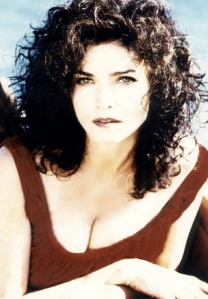
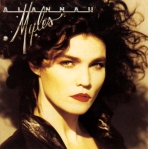
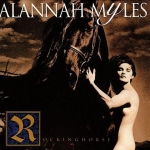

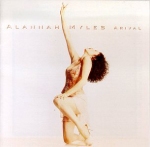
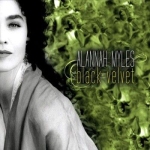


You must be logged in to post a comment.